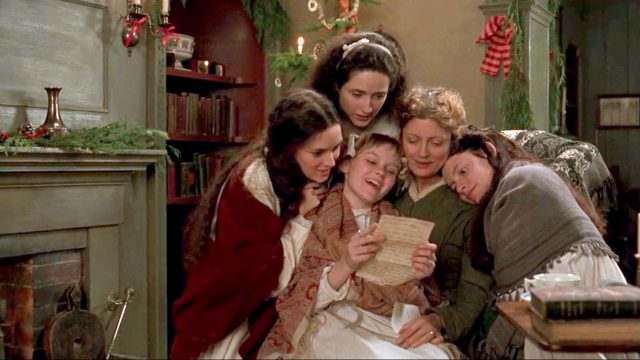I have to begin by saying that it has been decades since I read Louisa May Alcott’s original novel Little Women, so my essay will only be my opinion about the 1994 adaptation by Gillian Armstrong, which I first saw it when it first came out in 1994. Written by Robin Swicord, it’s the fifth feature film adaptation of the classic story.
Little Women is based in Concord, New Hampshire, where we come to know and love the March family: four sisters, Meg, Jo, Beth, and Amy, who live with their mother, whom they call Marmee, their father, and their housekeeper, Hannah. They are clearly a forward-thinking, progressive family. Marmee, who is outspoken for a woman of her era, is clearly raising the girls to be strong in the tough times of a war-torn country, but also kind, compassionate, and ladylike. Mrs. March also seems to encourage them to embrace who they are and pursue their dreams. They are struggling financially, and their father has been sent off to the Civil War to fight for Yankee territory. Some characters mention that the Marches “have views on slavery” which they make very apparent are abolitionist.
The cast of this film is top-notch. Susan Sarandon as Marmee, Trini Alvarado as Meg, Kirsten Dunst as Amy, Claire Danes as Beth — and oh yes, let’s not forget the early work of Christian Bale before he became the Dark Knight. These were all very popular and in-demand actors in the ’90s, and they all have tremendous screen presence and dedication to their characters. Winona Ryder’s work is the stand-out: her performance as Jo is captivating. She evokes sympathy and compassion from the audience as a wild-spirited young woman, desperate to be a writer, but also to find who she is and get away from the confines of her small town.
There are so many reasons why I loved this movie and still do. Besides being a huge fan of Winona Ryder’s acting, I find this movie lovely and endearing. I seldom enjoy period pieces. In fact, I can think of only two that I really enjoy and own: this and Sense and Sensibility. I find it hard to relate to the characters and the times they live in. The dialogue in this movie reflects the times, but it isn’t overly archaic, and the family, perhaps because they are poor, are interesting to watch in their daily lives. I also enjoy watching Jo attempt to grow: to assert herself as a writer, but also as an equally intelligent female in a male-dominated society.
We as the audience, are privy to the intimate lives of the women of this film and this time. They grow, they change, they face poverty, war, sickness, and uncertain futures. They face constant pressure to follow “proper” feminine behavior. They faced society’s restrictions on female potential and the reality that it may be impossible to achieve their goals. As we follow Jo, we get to see her live out her dreams as she finally starts a life in New York, live the life of a writer, and experience a society where she can participate equally with men. Her relationship with a German professor she meets in New York helps her grow and change as he supports her in their shared passions and pursuits. He is kind, he is wise, and they enjoy each other’s company as equals.
Jo’s story and the story of the March family is one of my favorite coming-of-age movies. Not only is it a magnificent story of life as a woman in the Civil War era, but it is heartwarming in its exploration of life and death, family, and the rights of women to pursue their passions.
Little Women is streaming on Netflix

